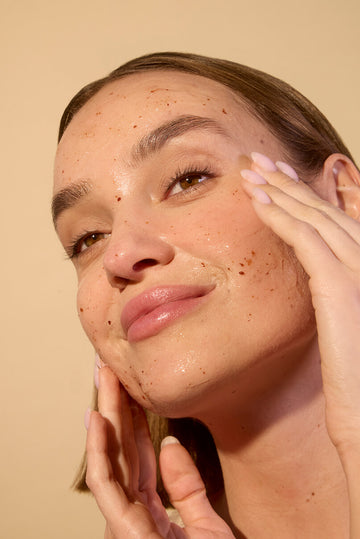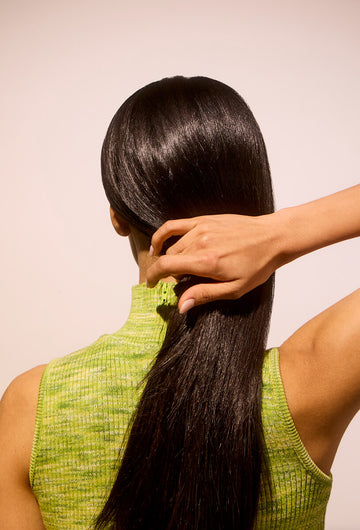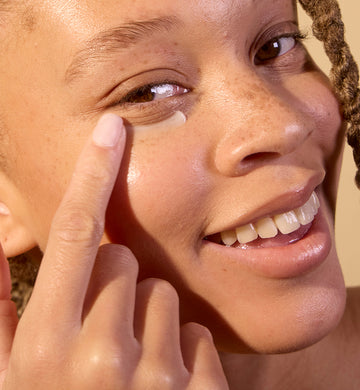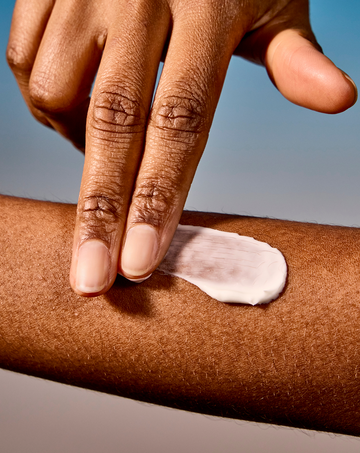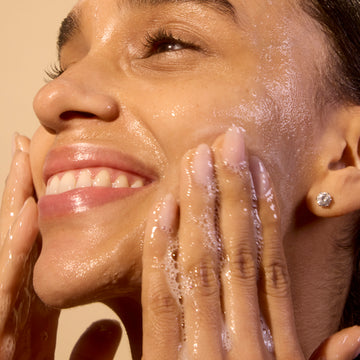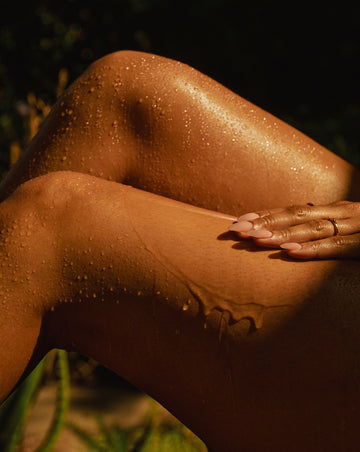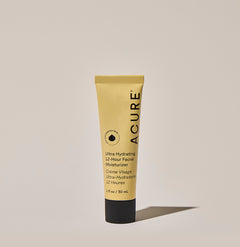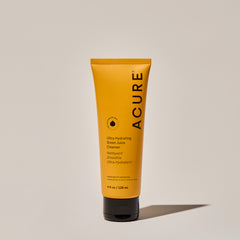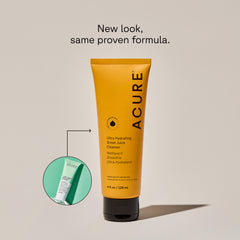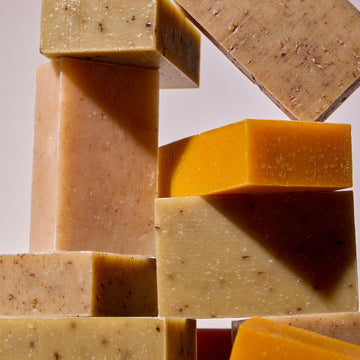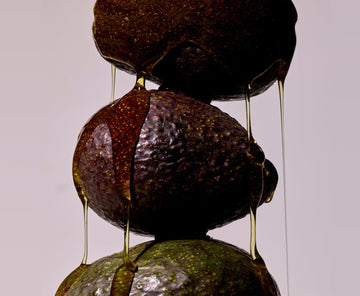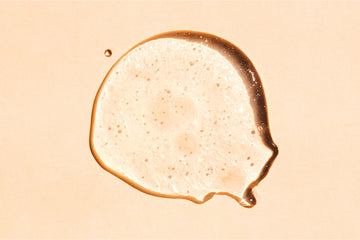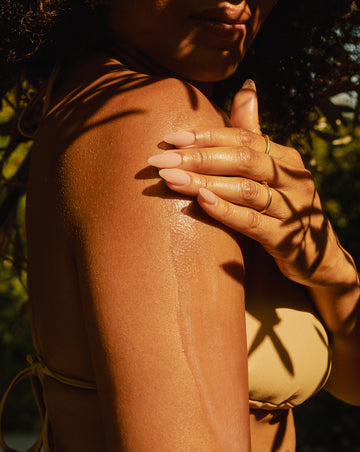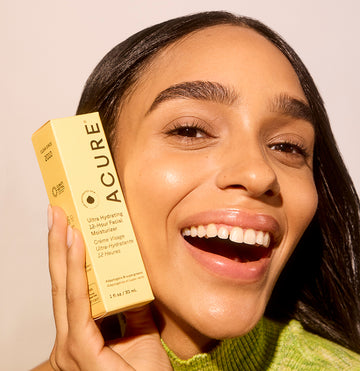TLDR: Dry skin and dehydrated skin aren’t the same. Here’s why it matters, and what you can do about it.
If you look up “dry” and "dehydrated” in the dictionary, you’ll find their definitions are nearly indistinguishable. In fact, dry appears as a synonym of dehydrated, and vice versa. Your skin, however, operates differently. A dry skin type is different from skin that’s dehydrated. Here’s how to know if your skin is dry, dehydrated, or both—and then, what to do about it.

What’s The Difference Between Dry & Dehydrated Skin?
Put simply, dry skin is your skin type (your skin’s natural state, determined by genetics), whereas dehydrated skin is a skin condition (a quality or concern that’s more indefinite).
Skin type is largely determined by genetics, but certain factors may cause your type to shift throughout your lifetime, such as age, hormonal changes, and environmental factors. According to the American Academy of Dermatology (AAD), the five primary skin types are: oily, dry, normal, combination, and sensitive. While there’s nothing you can do to intentionally alter your skin type, you can build a routine that complements and balances your skin type for optimal skin health. We’ll get to more specific later in the article. Skin conditions, on the other hand, vary in severity and longevity. Examples of skin conditions include dehydration, acne, eczema, and rosacea. The key to addressing skin conditions is identifying the root cause(s), and making routine and lifestyle changes accordingly. Again, we’ll dive into that in a bit, but first, let’s figure out what you’re dealing with.
What is Dry Skin? What Are The Signs of Dry Skin?
Dry skin is characterized by producing less sebum (natural oil) than other types. Signs of dry skin include a feeling of skin tightness, itchiness, flaking, scaling, cracking, fine lines, or dullness.
Dry skin can be caused by different factors, including aging, medications, low outdoor temperature, menopause or hormonal changes, vitamin or mineral deficiencies, smoking, various diseases, and cancer treatment. These can all play a part in stripping skin of the natural moisture that prevents skin from becoming dry.
What is Dehydrated Skin? What Are The Signs of Dehydrated Skin?
Dehydrated skin is a skin condition rather than a natural skin state, meaning that there are more obvious external factors at play causing dehydrated skin.
Healthy skin contains about 64% water. So when you’re dehydrated, more moisture is leaving than entering your skin.
So when you’re dehydrated, more moisture is leaving than entering your skin. This causes the body to route water away from your skin, in favor of keeping your organs functioning properly. Your skin needs water to give it strength and elasticity, which results in a smooth, radiant, and bouncy appearance.
The signs of dehydrated skin include: cracked lips, sunken eyes, acne, itchiness, low skin elasticity, and dry mucous membranes like your nose.
Dehydrated skin can be caused by many factors, which include but are not limited to: over-exfoliation, improper product usage, sweating, exercise, illness, sunburn, antihistamines, or a lack of water intake.
How To Treat Dry & Dehydrated Skin
Now that you're better able to discern which you’re dealing with, here’s what you can do about it.
Treating Dry Skin
As mentioned above, having dry skin isn’t something you should try to “cure.” Rather, you’ll benefit from establishing a consistent skincare routine that prioritizes replenishing moisture and locking it in.
So the first step is finding a quality moisturizer that works with your skincare routine and helps replenish the oils your skin is lacking.
Our Ultra Hydrating 12 Hour Facial Moisturizer does just that, using ingredients like spirulina to aid in moisture retention, plus squalane which replenishes the skin’s protective barrier and reduces TEWL (transepidermal water loss). Squalane is a key component of sebum, making it a great ingredient for dry skin types whose skin produces less natural oils.
Dry skin isn’t just limited to the face, however, so a full-body moisturizer, like our Seriously Soothing 24hr Moisture Lotion is another important daily step. Packed with cocoa butter, colloidal oatmeal, and deeply moisturizing aloe, it’s clinically shown to provide moisture for 24 hours.
Dry skin types should also avoid long, hot showers or baths (using cooler water when possible) and use a humidifier inside especially when it’s dry out. Daily sunscreen use is also essential to prevent UV rays from further damaging the skin.
And speaking of bathtime, dry skin types will love our Ultra Hydrating Body Wash which uses argan and pumpkin seed oils to moisturize the skin while you cleanse. This means the warm water won’t strip your skin or cause it to feel tight, allowing your skin to reap the benefits of the body wash.


Treating & Preventing Dehydrated Skin
A major culprit of dehydrated skin is simply a skincare routine that’s hurting your skin—instead of helping it. Try lowering your exfoliation cadence to just 1-2 times per week, and doing an ingredient audit of your products to suss out any that might be irritating.
Commonly irritants include harsh soaps, high percentages of active ingredients, or alcohols. You can identify alcohols by looking for words that start with “methanol,” “ethanol,” or “ethyl.” Or, you can breathe easy knowing Acure products contain none of that—and are also free from parabens, sulfates, mineral oil, petrolatum, and formaldehyde.
One easy swap for dehydrated skin types is your cleanser. Our Ultra Hydrating Green Juice Cleanser is creamy and non-stripping, with a smoothie-to-foam texture that deeply cleanses while refreshing the skin. A blend of kale, spinach, neem, and spirulina is basically like giving your skin a superfood green juice every time you cleanse your face.
Follow that up with our Ultra Hydrating Plant Ceramide Daily Facial Lotion, created specifically for dehydrated skin. Plant ceramides, niacinamide, and polyglutamic acid infuse skin with intense hydration to help reinforce your skin's moisture barrier.
Other preventative measures include drinking plenty of water, getting proper sleep, eating moisture-rich foods like fruits and veggies, including essential fats in your diet, and reducing caffeine and alcohol intake.


In Summary
TLDR; Dry skin and dehydrated skin aren’t the same, and should be treated as such. Dry skin types should be focused on long-term maintenance, with a solid routine that replenishes the natural oils your skin is lacking. Those who experience dehydration in their skin should focus on evaluating their current skin care routine and lifestyle habits, while making product swaps like a more hydrating cleanser or moisturizer.
View our entire collection of products for dry skin types here, or our collection for dehydration here.
All information, content, and material of this blog is for informational purposes only. This blog provides general information and discussions about health and beauty related subjects. The information and other content provided in this blog or in any linked materials are not intended and should not be considered, or used as a substitute for, consultation, medical advice, diagnosis and/or treatment of a qualified physician or healthcare provider.


